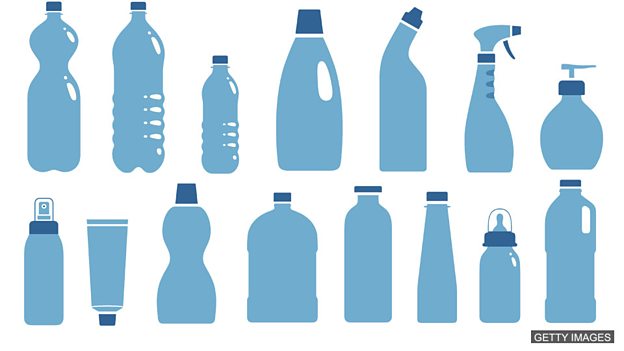气候变化仅仅是地球遇到的挑战之一,我们所居住的星球还面临着堆积如山的垃圾和废弃物,尤其是白色垃圾。一项研究说,自1950年至今,人类已生产出83亿吨塑料制品,并尚未找到有效处理和回收塑料制品的方法。我们能做些什么呢?
课文内容
Vocabulary: Environment 词汇: 环境
Here’s a staggering statistic. Scientists have calculated the total amount of plastic ever made: 8.3 billion tonnes. Looked at another way, that’s as heavy as 25,000 Empire State Buildings or one billion elephants. And incredibly, almost all of it has been made in the last 65 years.
So what’s the problem? Much plastic is in the form of packaging which is used just once and then thrown away. According to a major new study from the University of California, 9% of this is recyled, 12% is incinerated and 79% goes to landfill. And because most plastic doesn’t biodegrade, once it’s in the ground, it stays there.
It’s a situation that has led the paper’s lead author, ecologist Dr Roland Geyer, to say that we are “rapidly heading towards ‘Planet Plastic'”. He believes that there’s already enough waste out there to cover the whole of Argentina.
The team behind this report also estimate that eight million tonnes of plastic waste are escaping into the sea every year. This has generated concern that plastic is entering the food chain, though fish and other sea life which ingest the smaller fragments.
Of course, the reason why there’s so much plastic around is that it’s an amazingly useful material. We can’t get enough of it. It’s durable and adaptable, and is used for everything from yoghurt pots to spaceships. But it’s precisely this quality which makes it a problem. The only way to destroy plastic is to heat or burn it – although this has the side effect of harmful emissions.
So what’s the alternative, other than using less plastic? Oceanographer Dr Erik van Sebille from Utrecht University says we’re facing a “tsunami” of plastic waste, and that the global waste industry needs to “get its act together”.
Professor Richard Thompson, a marine biologist from Plymouth University, says it’s poor design that’s at fault. He says that if products are currently designed “with recyclability in mind”, they could be recyled around 20 times over.
Dr Geyer agrees: “The holy grail of recycling is to keep material in use and in the loop for ever if you can. But it turns out in our study that actually 90% of that material that did get recycled - which I think we calculated was 600 million tonnes - only got recycled once.”
词汇表
staggering 令人震惊的
packaging 包装材料
incinerate 被焚毁的
landfill 垃圾填埋场
biodegrade 生物降解
ecologist 生态学家
food chain 食物链
ingest 咽下(食物)
fragment 碎片,碎块
durable 耐用的
adaptable 适应性强的
emission 排放物
oceanographer 海洋学家
tsunami 海啸
get your act together 合理安排,有条理地筹划
marine biologist 海洋生物学家
at fault 有责任,有过错
recyclability 可再利用性
loop 循环
turn out 结果是(尤指出乎意料的结果)
测验与练习
1. 阅读课文并回答问题。
1. Where does the greatest proportion of plastic waste go?
2. How might plastic enter the food we eat?
3. What do Professor Thompson and Dr Geyer agree about?
4. Which word means ‘ability to be recycled’?
5. True or false: The fact that plastic is durable is good for the environment.
2. 请你在不参考课文的情况下完成下列练习。选择一个意思合适的单词填入句子的空格处 。
1. Marine biology and _______ are related subjects.
ecologist marines oceanographer oceanography
2. As _______, I study the relationships between all living things and their environment.
an ecologist a chemist an oceanographer a psychologist
3. You need to get _______ together. You can’t keep on handing in your homework late.
the act my act this act your act
4. Because it doesn’t _______, plastic waste is very harmful to the environment.
emit ingest biodegrade incinerate
5. Finding a new form of _______ energy is the holy grail for many environmentalists.
clean and renewable fossil fuel cheap modern and impressive
答案
1. 阅读课文并回答问题。
1. Where does the greatest proportion of plastic waste go?
An estimated 79% of plastic waste ends up in landfill.
2. How might plastic enter the food we eat?
It’s thought that small fragments of plastic are ingested by fish and other sea life, and from there it enters the food chain.
3. What do Professor Thompson and Dr Geyer agree about?
They agree that products need to be recycled many times over, not just once.
4. Which word means ‘ability to be recycled’?
Recyclability.
5. True or false: The fact that plastic is durable is good for the environment.
False. Plastic being durable is bad for the environment, because it needs to be disposed of in other ways.
2. 请你在不参考课文的情况下完成下列练习。选择一个意思合适的单词填入句子的空格处 。
1. Marine biology and oceanography are related subjects.
2. As ecologist, I study the relationships between all living things and their environment.
3. You need to get your act together. You can’t keep on handing in your homework late.
4. Because it doesn’t biodegrade, plastic waste is very harmful to the environment.
5. Finding a new form of clean and renewable energy is the holy grail for many environmentalists.




